Celebrating Some New Sensations
I've changed the way anybody who goes from Twenty to Forty has changed. I don't do a lot of things I used to do because I either didn't care or wasn't thinking correctly. and I think I am better and stronger for it.
- Lou Reed, on ABC's New York People, 1982-1983
The decade began with a coup. The 1980's, as biographer Aiden Levy described it in "Dirty Blvd.: The Life and Music of Lou Reed", was Reed's era of control. Following the April release of Growing Up in Public (1980), his last with Arista Records, and the subsequent packed-to-the-brim two-month-long tour, he took a year and a half hiatus. His recent marriage to his second wife Sylvia Morales served as a catalyst of change for Lou Reed. He quit drugs, alcohol, and for a brief time, his Rock and Roll lifestyle. He bought a house in Blairstown, a rural town buried in the north west corner of New Jersey, and joined both Alcoholics and Narcotics Anonymous.
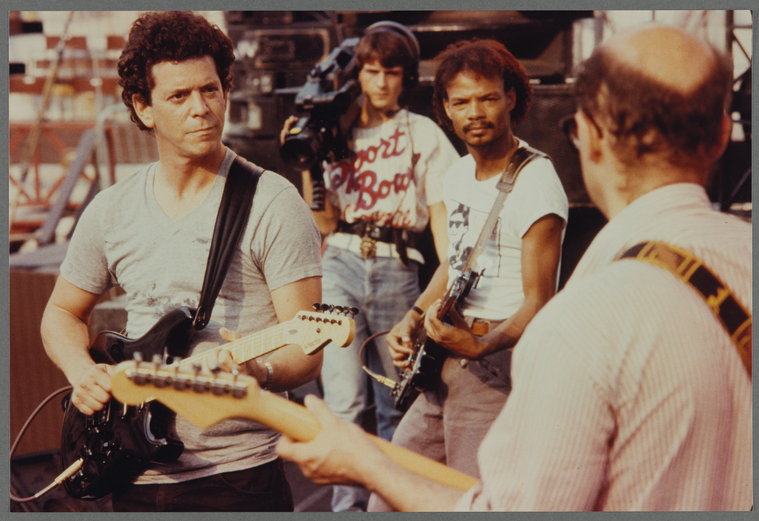
Lou Reed with Fernando Saunders and Robert Quine, soundcheck in Verona, Italy, 1983
(Lou Reed Papers)
A new kind of speed & the visual scene
One of the great departures from the old Lou Reed was his discovery of Motorcycles. If you define his career by way of his perennial interest in technology, the decade of the 1960s for him can be described as his pushing guitars and amps to their limits and his 1970s with his experimentation with newly invented consumer video cameras and the soundscape-crafting of binaural technology, then motorcycles might serve for his 1980s. The helmet you see on the cover of Legendary Hearts (1983) was Lou Reed's - the same one seen above on display at NYPL Library for the Performing Arts, on loan from Laurie Anderson - worn on his rides around the tri-state area and down into Delaware. Motorcycling became his new drug of choice, becoming a muse, and one which he would factor into his live sets, studio recordings, and off stage persona. It didn't hurt that chrome and leather jackets are sometimes just cool.
If casual Lou Reed fans have seen any footage of '80s Lou Reed, it's what can been seen in one of the highlights of the Lou Reed Papers video collection - Lou Reed sitting on, of all things, a Honda scooter. Not on one of his beloved Harvey Davidsons or Kawasakis, though we have footage of those too. Underscored by "Walk on the Wild Side" and prefaced with frenetic shots of Lower East Side street life, Lou Reed in all his stately "cool" delivers the line:
Hey, don't settle for walkin'
Aired in 1985, the footage in question is a Honda Scooter commercial and it illustrates something important about this new era of Lou Reed - the intense, self-assured, standing of a career musician; a businessman with a voice and identity who understands what his art can buy. It also represents one of the surprising though ultimately obvious corners of the Lou Reed Papers' video collection - the polished Reed of big and small screen.
He brought it all together in the title song on his 1984 album New Sensations:
I don't like guilt be it stoned or stupid Drunk and disorderly I ain't no cupid Two years ago today I was arrested on Christmas Eve
I don't want pain, I want to walk not be carried I don't want to give it up, I want to stay married I ain't no dog tied to a parked car
...
I took my GPZ out for a ride The engine felt good between my thighs The air felt cool, it's was forty degrees outside
I rode to Pennsylvania near the Delaware Gap Sometimes I got lost and had to check the map I stopped at a roadside diner for a burger and a coke
There were some country folk and some hunters inside Somebody got themselves married and somebody died I went to the juke box and played a hillbilly song
They was arguing about football as I waved and went outside And I headed for the mountains feeling warm inside I love that GPZ so much, you know that I could kiss her
...
Talkin' 'bout your new sensations Talkin' new sensations
MTV Lou Reed
Along with the rest of the music world, the MTV wave crashed into Lou Reed. Ever interested in trying new things, he was happy to explore the world of Music Videos and created some that aged better than many of their contemporaries. In the Lou Reed Papers we have music videos for the songs listed below:
- Women from The Blue Mask (1982)
- My Name Is Mok from the unreleased soundtrack of film Rock & Rule (1983)
- Don't Talk To Me About Work from Legendary Hearts (1983)
- Legendary Hearts from Legendary Hearts (1983)
- I Love You, Suzanne from New Sensations (1984)
- No Money Down from Mistrial (1987)
- The Original Wrapper from Mistrial (1987)
- Halloween Parade from New York (1989)
- Busload of Faith from New York (1989)
- Dirty Blvd. from New York (1989)
Two Lou Reed collaborations this decade were accompanied by music videos. The first was for a collaboration with Sam Moore on the titular track for the 1986 movie Soul Man, and the second is a duet Reed did with his then bassist Rob Wasserman:
- Soul Man by Sam Moore & Lou Reed from Soul Man (Original Motion Picture Soundtrack) (1986)
- One For My Baby (And One More For The Road) by Rob Wasserman & Lou Reed from Duets (1988)
Lou Reed was also featured in music videos by friends throughout the '80s:
- Sweet Jane by The Jim Carroll Band from I Write Your Name (1983)
- Written on the Subway Wall by Dion from Yo Frankie (1989)
Lastly, for the anti-apartheid benefit album Sun City, Lou Reed collaborated with over 50 musicians as part of Artists United Against Apartheid:
- Sun City by Artists United Against Apartheid from Sun City (1985)
Lou Reed as a personality was also featured multiple times on MTV, hosting as guest VJ programs PostModern MTV on June 1 & 2, 1989 and 120 Minutes on July 11, 1986. His most prominent feature on MTV during the '80s was his co-hosting the 1987 MTV Music Awards pre-show with magician duo, and Reed's personal friends, Penn & Teller.
Available at the Library: 1980-1989
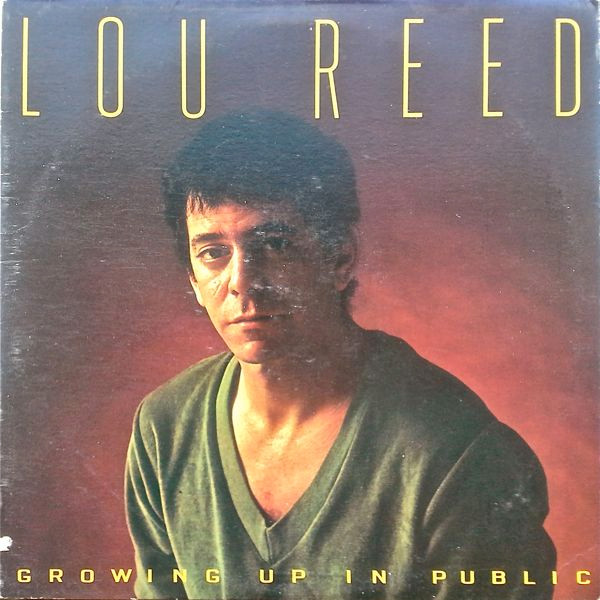 Growing Up In Public by
How do you speak to an angel -- My old man -- Keep away -- Growing up in public -- Standing on ceremony -- So alone -- Love is here to stay -- The power of positive drinking -- Smiles -- Think it over -- Teach the gifted children.
Call Number: *LDC 37419 [CD]Publication Date: 1980
Growing Up In Public by
How do you speak to an angel -- My old man -- Keep away -- Growing up in public -- Standing on ceremony -- So alone -- Love is here to stay -- The power of positive drinking -- Smiles -- Think it over -- Teach the gifted children.
Call Number: *LDC 37419 [CD]Publication Date: 1980The Blue Mask by My house Women Underneath the bottle The gun The blue mask Average guy The heroine Waves of fear The day John Kennedy died Heavenly arms.
Call Number: CD ROCK REED,LOU-0890Publication Date: 1982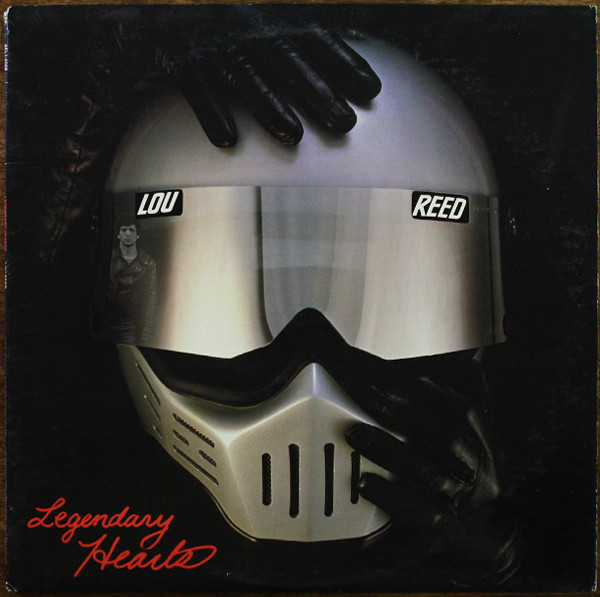 Legendary Hearts by
Legendary hearts
Don't talk to me about work
Make up mind
Martial law
The last shot
Turn out the light
Pow wow
Betrayed
Bottoming out
Home of the brave
Rooftop garden
Call Number: CD ROCK REED,LOU-9686Publication Date: 1983
Legendary Hearts by
Legendary hearts
Don't talk to me about work
Make up mind
Martial law
The last shot
Turn out the light
Pow wow
Betrayed
Bottoming out
Home of the brave
Rooftop garden
Call Number: CD ROCK REED,LOU-9686Publication Date: 1983New Sensations by I love you, Suzanne (3:16) Endlessly jealous (3:57) My red joystick (3:35) Turn to me (4:23) New sensations (5:46) Doin' the things that we want to (3:55) What becomes a legend most (3:37) Fly into the sun (3:06) My friend George (3:56) High in the city (3:26) Down at the arcade (3:40).
Call Number: CD ROCK REED,LOU-9762Publication Date: 1984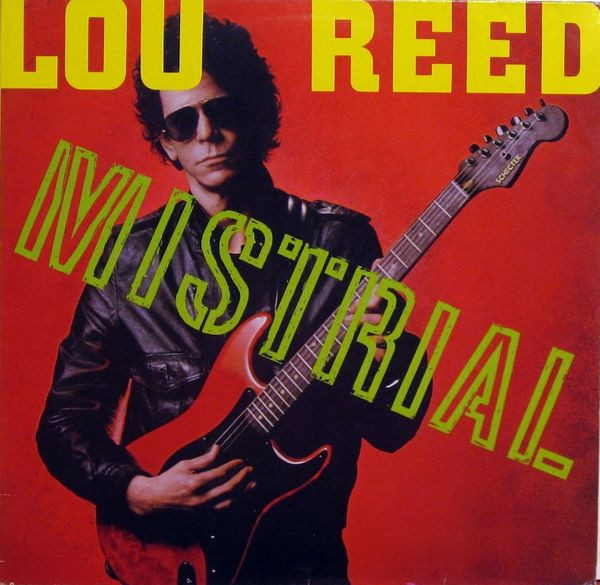 Mistrial by
Mistrial (3:32)
No money down (3:10)
Outside (3:05)
Don't hurt a woman (4:01)
Video violence (5:36)
Spit it out (3:34)
The original wrapper (3:38)
Mama's got a lover (4:11)
I remember you (2:55)
Tell it to your heart (5:11)
Call Number: *LSRX 20362 (F) [Disc]Publication Date: 1986
Mistrial by
Mistrial (3:32)
No money down (3:10)
Outside (3:05)
Don't hurt a woman (4:01)
Video violence (5:36)
Spit it out (3:34)
The original wrapper (3:38)
Mama's got a lover (4:11)
I remember you (2:55)
Tell it to your heart (5:11)
Call Number: *LSRX 20362 (F) [Disc]Publication Date: 1986New York by Romeo had Juliette (3:09) Halloween parade (3:33) Dirty Blvd. (3:29) Endless cycle (4:01) There is no time (3:45) Last great American whale (3:42) Beginning of a great adventure (4:57) Busload of faith (4:50) Sick of you (3:25) Hold on (3:24) Good evening Mr. Waldheim (4:35) Xmas in February (2:55) Strawman (5:54) Dime store mystery (5:01)
Call Number: CD ROCK Reed,Lou-1567Publication Date: 1989
Compilations & Soundtracks
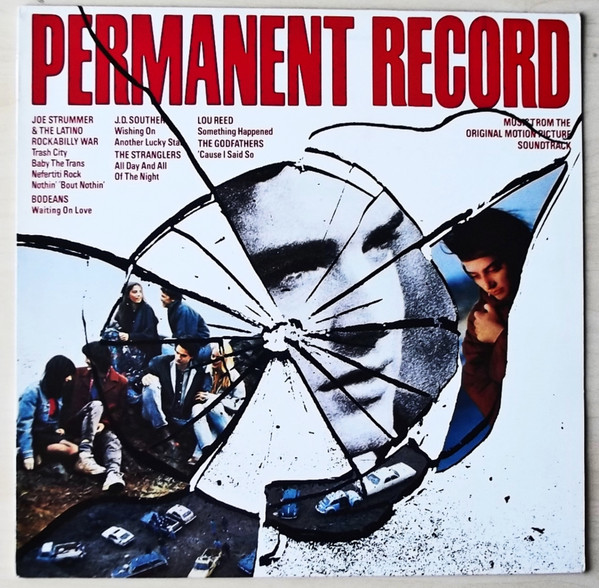 Permanent Record - Music From The Original Motion Picture Soundtrack by
Trash City by Joe Strummer (4:12)
Baby The Trans by Joe Strummer (2:19)
Nefertiti Rock by Joe Strummer (2:11)
Nothin' 'Bout Nothin' by Joe Strummer (2:31)
Theme From Permanent Record - Instrumental Score by Joe Strummer (3:20)
'Cause I Said So by The Godfathers (2:46)
Waiting On Love by BoDeans (3:52)
Wishing On Another Lucky Star by J.D. Souther (3:45)
All Day And All Of The Night by The Stranglers (2:30)
Something Happened by Lou Reed (4:00)
Call Number: *LDC 7954 (F)Publication Date: 1988
Permanent Record - Music From The Original Motion Picture Soundtrack by
Trash City by Joe Strummer (4:12)
Baby The Trans by Joe Strummer (2:19)
Nefertiti Rock by Joe Strummer (2:11)
Nothin' 'Bout Nothin' by Joe Strummer (2:31)
Theme From Permanent Record - Instrumental Score by Joe Strummer (3:20)
'Cause I Said So by The Godfathers (2:46)
Waiting On Love by BoDeans (3:52)
Wishing On Another Lucky Star by J.D. Souther (3:45)
All Day And All Of The Night by The Stranglers (2:30)
Something Happened by Lou Reed (4:00)
Call Number: *LDC 7954 (F)Publication Date: 1988 Just Say Mao (Volume III Of Just Say Yes) by
Everything Counts (Bomb-Beyond-The-Yalu-Mix) by Depeche Mode (5:31) | In A Manner Of Speaking by Martin Gore (4:11) | Accidentally 4th Street (Gloria) (Remix) by Figures On A Beach (4:05) | Thrash by Underworld (4:20) | Pistol by Erasure (3:27) | Insha-Allah by Nasa (7:16) | Dizzy (Remix) by Throwing Muses (3:31) | Whistling For His Love (Remix) by Danielle Dax (6:16) | Lucky Lisp by Morrissey (2:54) | Between Something And Nothing by The Ocean Blue (4:00) | Da'Ale Da'Ale (Remix) by Ofra Haza (6:05) | Don't Say No (Remix) by Tom Tom Club (4:01) | The Hunted Child by Ice-T (4:27) | Nanana by Royal Crescent Mob (3:46) | Date To Church by The Replacements (3:49) | Nowhere To Stand by k.d. lang (4:27) | Strawman (Live) by Lou Reed (6:05)
Call Number: *LDC 3424 (F)Publication Date: 1989
Just Say Mao (Volume III Of Just Say Yes) by
Everything Counts (Bomb-Beyond-The-Yalu-Mix) by Depeche Mode (5:31) | In A Manner Of Speaking by Martin Gore (4:11) | Accidentally 4th Street (Gloria) (Remix) by Figures On A Beach (4:05) | Thrash by Underworld (4:20) | Pistol by Erasure (3:27) | Insha-Allah by Nasa (7:16) | Dizzy (Remix) by Throwing Muses (3:31) | Whistling For His Love (Remix) by Danielle Dax (6:16) | Lucky Lisp by Morrissey (2:54) | Between Something And Nothing by The Ocean Blue (4:00) | Da'Ale Da'Ale (Remix) by Ofra Haza (6:05) | Don't Say No (Remix) by Tom Tom Club (4:01) | The Hunted Child by Ice-T (4:27) | Nanana by Royal Crescent Mob (3:46) | Date To Church by The Replacements (3:49) | Nowhere To Stand by k.d. lang (4:27) | Strawman (Live) by Lou Reed (6:05)
Call Number: *LDC 3424 (F)Publication Date: 1989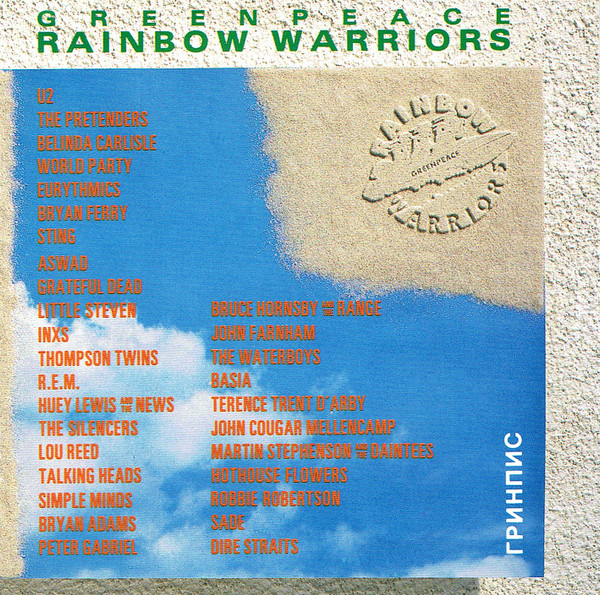 Greenpeace Rainbow Warriors by
Pride (In The Name Of Love) (Live) by U2 (4:32)
Middle Of The Road by The Pretenders (4:12)
Heaven Is A Place On Earth by Belinda Carlisle (4:04)
Ship Of Fools by World Party (4:14)
When Tomorrow Comes by Eurythmics (4:27)
Don't Stop The Dance by Bryan Ferry (4:19)
Love Is The Seventh Wave by Sting (3:29)
Set Them Free by Aswad (3:58)
Throwing Stones by Grateful Dead (4:23)
Balance by Little Steven (5:15)
This Time by INXS (3:07)
Lay Your Hands On Me by Thompson Twins (4:21)
It's The End Of The World As We Know It (And I Feel Fine) by R.E.M. (2:59)
Small World by Huey Lewis And The News (4:41)
Scottish Rain by The Silencers (7:11)
Last Great American Whale by Lou Reed (3:42)
City Of Dreams by Talking Heads (5:06)
Waterfront (Live) by Simple Minds (5:06)
Somebody by Bryan Adams (4:42)
Red Rain by Peter Gabriel (5:34)
Look Out Any Window by Bruce Hornsby And The Range (5:27)
You're The Voice by John Farnham (5:05)
The Whole Of The Moon by The Waterboys (4:57)
Miles Away by Basia (4:10)
Let's Go Forward by Terence Trent D'Arby (5:17)
We Are The People by John Cougar Mellencamp (4:16)
Wholly Humble Heart by Martin Stephenson And The Daintees (5:44)
Hard Rain by Hothouse Flowers (4:00)
Somewhere Down The Crazy River by Robbie Robertson (4:58)
I Will Be Your Friend by Sade (4:42)
Why Worry by Dire Straits (5:18)
Call Number: *LDC 1894 (F) Program notes on file.Publication Date: 1989
Greenpeace Rainbow Warriors by
Pride (In The Name Of Love) (Live) by U2 (4:32)
Middle Of The Road by The Pretenders (4:12)
Heaven Is A Place On Earth by Belinda Carlisle (4:04)
Ship Of Fools by World Party (4:14)
When Tomorrow Comes by Eurythmics (4:27)
Don't Stop The Dance by Bryan Ferry (4:19)
Love Is The Seventh Wave by Sting (3:29)
Set Them Free by Aswad (3:58)
Throwing Stones by Grateful Dead (4:23)
Balance by Little Steven (5:15)
This Time by INXS (3:07)
Lay Your Hands On Me by Thompson Twins (4:21)
It's The End Of The World As We Know It (And I Feel Fine) by R.E.M. (2:59)
Small World by Huey Lewis And The News (4:41)
Scottish Rain by The Silencers (7:11)
Last Great American Whale by Lou Reed (3:42)
City Of Dreams by Talking Heads (5:06)
Waterfront (Live) by Simple Minds (5:06)
Somebody by Bryan Adams (4:42)
Red Rain by Peter Gabriel (5:34)
Look Out Any Window by Bruce Hornsby And The Range (5:27)
You're The Voice by John Farnham (5:05)
The Whole Of The Moon by The Waterboys (4:57)
Miles Away by Basia (4:10)
Let's Go Forward by Terence Trent D'Arby (5:17)
We Are The People by John Cougar Mellencamp (4:16)
Wholly Humble Heart by Martin Stephenson And The Daintees (5:44)
Hard Rain by Hothouse Flowers (4:00)
Somewhere Down The Crazy River by Robbie Robertson (4:58)
I Will Be Your Friend by Sade (4:42)
Why Worry by Dire Straits (5:18)
Call Number: *LDC 1894 (F) Program notes on file.Publication Date: 1989
